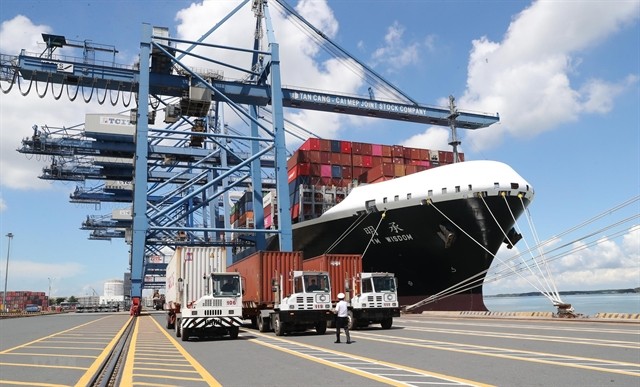 |
Tan Cang Cai Mep International Terminal. Vietnam’s trade is predicted to hit US$700 billion this year.(Photo: VNA) |
According to the office, the country has exported $49.44 billion worth of goods so far this year, down 10.4 percent over the same period last year, with $37.92 billion coming from the foreign-invested sector, accounting for 76.7 percent.
In February alone, total export revenue is estimated at US$25.88 billion, up 9 percent over January and 11 percent year on year.
In the first two months of this year, eight kinds of products recorded exports of over US$1 billion, accounting for more than 69.9 percent of the total. Particularly, three enjoyed revenue of over US$5 billion.
The manufacturing-processing sector contributed US$44.38 billion to the country’s total two-month export revenue, accounting for 89.8 percent, while agro-forestry sector made up 6.9 percent, fisheries 2 percent and fuel and minerals 1.3 percent.
In January and February, the country spent US$46.62 billion on importing goods, down 16 percent year on year, mostly on production materials.
In February, the figure dropped 6.7 percent over the same period last year to US$23.58 billion.
In the first two months of this year, imports of 13 groups of goods exceeded US$1 billion, with two recording imports worth more than US$5 billion.
So far this year, the US has remained the largest import market of Vietnam with a revenue of US$13.1 billion, while China has been the country's biggest exporter with a value of about US$14.6 billion.
In the January-February period, Vietnam’s trade surplus with the EU is estimated at US$4.8 billion, up 1.8 percent.
Meanwhile, the country has suffered a trade deficit of US$6.4 billion with China, US$4.7 billion with the Republic of Korea, US$1.5 billion with ASEAN countries, and US$237.2 million with Japan.
To meet the target of about 6 percent growth in export revenue this year, the Ministry of Industry and Trade has asked businesses to actively improve the competitiveness of their products, while expanding their export markets.
The ministry will strengthen the exploitation of potential markets while switching to official export channels in association with the building of trademarks. The ministry will also renovate its trade promotion activities and develop digital infrastructure to increase distribution through e-commerce platforms.
Besides, the ministry will organize training courses for businesses and support them to make full use of free trade agreements.
Agro-forestry-aquatic exports up 5.7 percent in February
Vietnam earned over $3.4 billion from agro-forestry-aquatic product exports last month, a year-on-year increase of 5.7 percent, the Ministry of Agriculture and Rural Development said.
The sector’s import-export value in the first two months of this year was estimated at US$11.99 billion, down 16.8 percent from the same period last year. Its exports accounted for around US$6.28 billion, a drop of 22.5 percent.
After falling to second position among Việt Nam’s agro-forestry-aquatic importers, China returned to the top spot in the first two months of the year with US$1.27 billion or 20.2 percent of the market share. It was followed by the US with some US$1.19 billion; Japan, US$563 million; and the Republic of Korea, US$302 million.
Items that saw hikes in export revenues included tea, up 5.1 percent; fruits and vegetables, 17.8 percent; cassava and cassava products, 32.7 percent; milk and dairy products, 10.2 percent; and meat and by-products, 14.2 percent.
Meanwhile, staples such as coffee, rubber, rice, cashew nuts, pepper, tra fish (pangasius), shrimp, wood and wooden products, and rattan and bamboo products experienced decreases.
To promote the consumption of farm produce, the ministry said it will step up market development, remove barriers and facilitate domestic sales and exports while utilizing free trade agreements (FTAs), especially the Comprehensive and Progressive Agreement for Trans-Pacific Partnership (CPTPP) and the EU-Vietnam Free Trade Agreement (EVFTA).
The sector will also continue its coordination to support the protection of trademarks and geographical indications for Vietnam’s potential export items abroad. It proposed the Government build a decree on the management of Việt Nam's national agricultural product brands.
Representatives from the ministry will hold working sessions with China’s Nanning and Yunnan customs forces to seek ways to promote trade and remove obstacles to agro-forestry-aquatic exports.
























